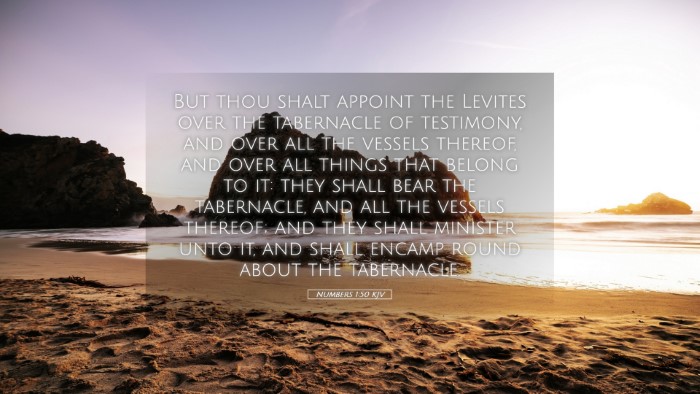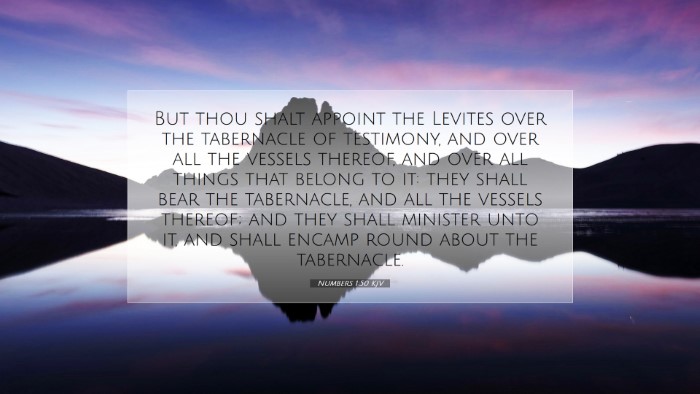Commentary on Numbers 1:50
Text of Numbers 1:50: "But appoint the Levites over the tabernacle of the testimony, and over all the vessels thereof, and over all things that belong to it: they shall bear the tabernacle, and all the vessels thereof; and they shall minister unto it, and shall encamp round about the tabernacle."
Introduction
This verse from the Book of Numbers lays down the responsibilities of the Levites concerning the Tabernacle and its sacred vessels. It is a pivotal moment in the organization of worship and the sacrificial system, highlighting the critical role of the Levites in the life of Israel. The exposition below draws from esteemed public domain commentaries to elucidate its meaning and implications.
Historical Context
Numbers is a book that describes the experiences of the Israelites during their wilderness wanderings. After leaving Egypt, Israelites are organized into a community marked by ritual and law. The appointment of the Levites signifies a divine order for worship, essential for maintaining relationship with God in the midst of their journey.
Role of the Levites
Matthew Henry comments on the special calling of the Levites, noting that they were chosen by God for a unique purpose: "They were to be the ministers of the sanctuary, the caretakers of the divine presence among them." Their role was multifaceted; not only were they responsible for the Tabernacle and its furnishings, but they also served as intermediaries between God and the people.
Divine Appointment
Albert Barnes emphasizes that the selection of the Levites was a sacred appointment by God, which establishes their deterrent role against unauthorized access to the holy items. This divine appointment underscores that the worship of Yahweh must be conducted in accordance with His ordained plan, reflecting His holiness and order.
The Tabernacle as a Center of Worship
Adam Clarke clarifies the significance of the Tabernacle, explaining that it represents God’s dwelling among His people. "The Tabernacle was the place where the divine presence was concentrated, and thus its protection and maintenance by the Levites was paramount." This places the Levites not just as custodians but essential to the ongoing worship and sacrificial systems, which were fundamental to Israelite faith and identity.
Spiritual Significance
The instructions to appoint the Levites reveal deeper theological implications. The Levites’ role is seen not merely in terms of physical service but also in spiritual representation.
Covenantal Relationship
The dedication of the Levites to the Tabernacle illustrates the covenantal relationship God seeks with His people. As stated by Matthew Henry, "The Levites were chosen to serve not just out of duty, but out of a relationship characterized by reverence and love for God." Their ministry was significant for maintaining this relationship and ensuring that worship was conducted correctly.
Symbolism of Ministry
Barnes notes the symbolic functions of the Levites' ministry: "They represent all believers as a holy priesthood, called to offer spiritual sacrifices." The Levites’ actions foreshadow the New Testament's declaration of all believers as priests under Christ, bearing the responsibilities of service and worship.
Practical Applications for Today's Church
Numbers 1:50 continues to resonate with contemporary church life, reminding congregations of the importance of order, responsibility, and divine calling in ministry.
Order in Worship
The careful organization of the Levites over the Tabernacle serves as a template for church leadership today. As Henry writes, “In every assembly of the faithful, there must be appointed persons to oversee worship and spiritual matters.” Therefore, churches should emphasize the appointment and role of leaders who are dedicated to maintaining the integrity of worship.
Call to Service
Every believer is summoned to serve, echoing the Levites' dedication. Clarke remarks, "The lesson for us is to embrace our roles within the church with a spirit of servitude." Understanding this calling can lead to a more effective and passionate expression of faith.
Guardians of God's Presence
The Levites' responsibility to guard the tabernacle mirrors the church's call to protect and promote the sanctity of God’s presence within the community. As Barnes states, "Believers are called to safeguard the gospel and the practices that honor God, ensuring that they are upheld with integrity and reverence." This can inspire modern congregations to take seriously their role as stewards of faith.
Conclusion
Numbers 1:50 encapsulates a critical aspect of Israelite worship and community life. By highlighting the obligations assigned to the Levites, this verse emphasizes themes of divine order, sacred responsibility, and covenant relationship. The insights gleaned from prominent commentaries deepen our understanding of these themes and their implications for contemporary faith practice, challenging us to uphold God's holiness in worship and ministry.


